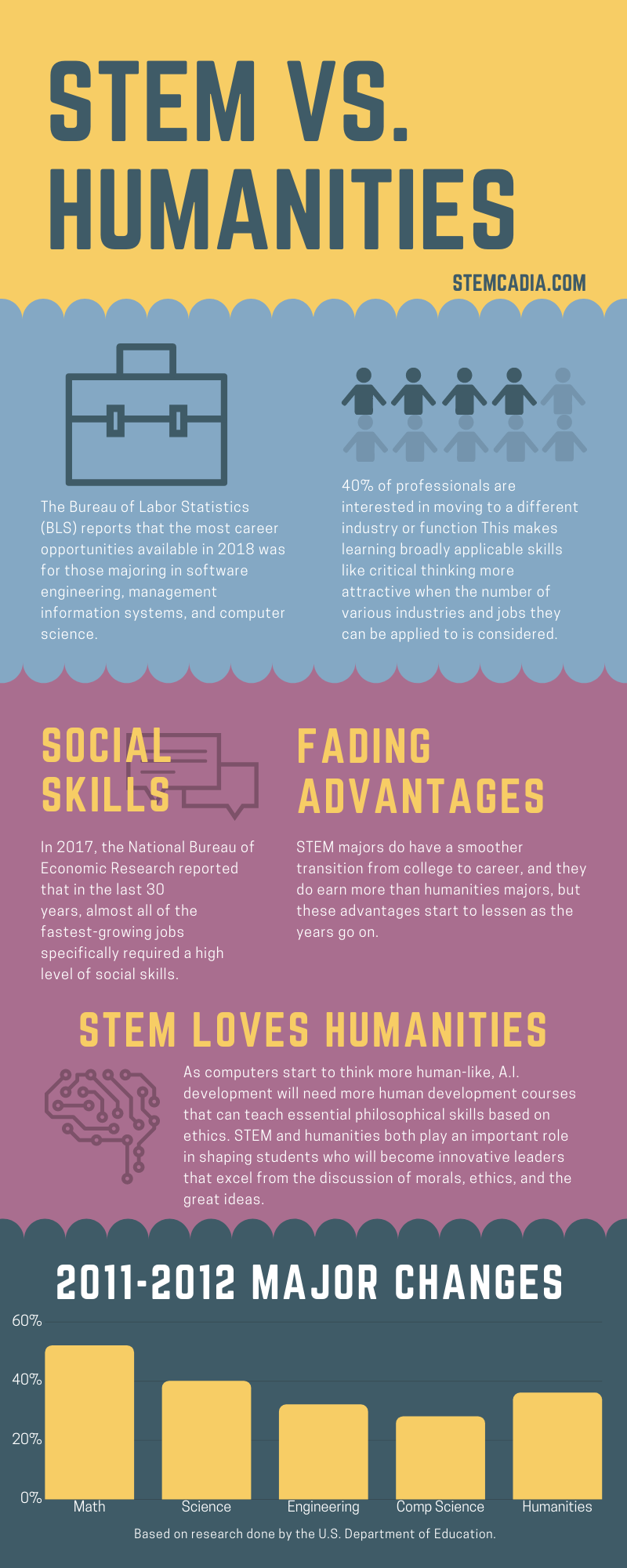“STEM vs. humanities” should be more like “STEM loves humanities.” If you clicked on this page hoping you’d find out which one ultimately reigns supreme, you’ve unfortunately come to the wrong place. You can try searching somewhere else for that, but I’ve already done the looking for you. As much as I would like to see reliable evidence proving STEM is better, I have found no such thing.
STEM majors focus on engineering new technology based on scientific data analyzed by mathematics. Humanities majors focus on the understanding of humanity through the exploration of art and ethics. Studying the humanities is essential in order to maintain a functioning society that is thoughtful through the investigation of the uncertainties that exist outside of STEM.
Picking one while ignoring the other would be unwise. If you plan on going to college, you might think you will eventually have to, but that’s not true. STEM needs humanities as much as humanities needs STEM. This post will explain why.
Table of Contents
STEM vs. Humanities is a Misconception
STEM and humanities is like a well-balanced meal. Have too much protein without any fiber from vegetables and you might feel pretty bloated. Have too much fiber without and protein and you may not be able to get out of the bathroom!
The benefits of STEM include tools for innovation, a better understanding of the world’s functioning, logical thinking development, math skills, and problem-solving skills. Some benefits of humanities include a more broad knowledge of different subjects, analysis skills, discovering morality and ethics, critical thinking, and understanding and empathy for others.
Ideally, students would get a well-rounded education full of humanities and STEM classes. They would be interested in what they study as they enhance their rational and scientific minds with a vast spiritual and moral foundation.
But, equal STEM and humanities educational programs are, unfortunately, not available… yet. Right now, STEM classes are getting a lot of attention in U.S. education while humanities is taking the back seat. This is creating the wrong perception that preparing students in STEM is more important than humanities.
Ideally, students would get a well-rounded education full of humanities and STEM classes.
It is no secret that this is all political. It all started in the early 2000s when U.S. students were found to rank significantly lower on standardized tests compared to its global competitors, namely China. In China, the government plans on supporting 42 universities to achieve “world class” status to promote its competitiveness around the world. This resulted in a modern day Sputnik moment where a race to the Moon has become a race to the smartest technological advancements.
This resulted in the U.S. reacting to get its youth more excited about innovative fields: science, technology, engineering, and math. We were convinced that philosophy majors wouldn’t be the ones bringing the U.S. to the front of the global tech race.
With this push for engineering and technical courses and careers, students have become convinced that a STEM career equals a successful career. It is a difficult time to major in philosophy. Many believe that STEM is the number one way to create jobs and shape a modernized future.
With some exceptions, STEM degree holders will indeed make more money than humanities degree holders at the starting gate. But, just like when the Planeteers put their powers together to summon Captain Planet to take care of big evil polluters, STEM and humanities are more powerful when combined.
STEM Major Overview
Across many industries, STEM degrees are in high demand.
In the early 2000s, industry analysts found a trend that showed an academic STEM deficiency from students going into college and for graduates entering the workforce looking for job opportunities related to STEM.
For the U.S. to have a thriving economy, innovation in technology and science was considered to be the way to get it. This resulted in the America COMPETES Act of 2007, which was started to support initiatives in special workforce and educational development promoting STEM subjects.
Not all degree programs under STEM are created equally. They are all, of course, challenging, but some open up the doors to more job opportunities than others. Engineering and computing degree programs have the highest demand based on job prospects. Specifically, system analysis, computer networking, and software engineering degree programs have the most job prospects. The Bureau of Labor Statistics (BLS) reports that the most career opportunities available in 2018 was for those majoring in software engineering, management information systems, and computer science. Other majors, such as natural sciences, physics, and mathematics, are still in demand, but many times lead to working as academic researchers. These mathematicians and scientists are, no doubt, talented, but are in high competition for a lower supply of research jobs compared to careers in technology.
Preparation for college-level STEM starts with early activities. High schools currently offer programs focused on building STEM skills. More serious students may go to summer workshops or acquire a tutor for extra help. For example, Hofstra University offers a “Precollegiate” STEM program for those who are interested in STEM professions.
There is a high supply of most careers related to STEM and receive support from many public and private educational initiatives. But, only moderate success has been achieved through these initiatives. College students are initially attracted to exciting and high-paying STEM careers but often realize the coursework to be too hard to complete. Studies by the U.S. Department of Education have shown that despite having high school programs help prepare for STEM courses, many times, students end up choosing not to go through the difficult STEM coursework and instead switch to liberal arts majors. But, those who are prepared enough and finish STEM degree programs have many available career opportunities.
Humanities Major Overview
The humanities, aka social sciences, are part of liberal arts, but not all of it. Liberal arts also include science and mathematics so it should not be used interchangeably with humanities. The Merriam-Webster Dictionary defines humanities as “the branches of learning (such as philosophy, arts, or languages) that investigate human constructs and concerns as opposed to natural processes (as in physics or chemistry) and social relations (as in anthropology or economics).”
Humanities majors can learn about all facets of society from human relationships to past achievements. The goal is to develop problem-solving and researching, reading, and writing skills.
Humanities degrees should pair with students’ scope of interests. The main focus of its study is research that reflects the inability of humans to ever be objective. Some values that come with this research include aesthetic appreciation, personal and spiritual development, and innovation.
The rise of STEM and it being seen as the key to global competitiveness has created incorrect assumptions about the market value of humanities degrees.
Silicon Valley may seem like a place that only valued a STEM education. Still, some of the biggest tech companies have been found to understand the importance of humanities degree holders. Uber has hired psychology majors to study unhappy drivers and riders. OpenTable, the online dinner booking service, has hired English majors to call on restaurateurs to share insights coming from OpenTables data team.
The rise of STEM and it being seen as the key to global competitiveness has created incorrect assumptions about the market value of humanities degrees.
It is essential to look at what skills employers are looking for. According to research done by LinkedIn, the top three most-wanted soft-skills were collaboration, creativity, and persuasion. In 2017, the National Bureau of Economic Research reported that in the last 30 years, almost all of the fastest-growing jobs specifically required a high level of social skills.
You can, of course, be a great critical thinker and communicator without a humanities degree. Any degree can enhance writing, research, problem-solving, and teamwork skills, but humanities degrees are usually more heavy on sharpening these skills through analyzing poetry, writing a thesis paper, or debating other students.
That is why the most significant number of humanities graduates move on to positions in management. The second largest group goes on to administration positions, and the third-largest go on to sales.
It is often assumed that the careers that humanities graduates go after aren’t as good as jobs pursued by STEM graduates, but that isn’t always true. Two of Australia’s top ten fastest-growing occupations are sales managers and sales assistants, and eight out of the top ten best jobs in the U.K. were managerial roles outside of STEM-based industries. A study done by the British Council in 2015 of over 1,500 people from thirty countries reveals that most people in leadership positions possessed either a humanities or social sciences degree.
This doesn’t mean that getting a humanities degree is easy. The first five to ten years into careers of students that hold a humanities degree is difficult because they often don’t gain as many technical skills compared to STEM degree holders.
But, pursuing a STEM degree is risky as well. Teenagers often don’t exactly know what career they want to pursue, and once they think they do, it often changes over time. Research by LinkedIn revealed that 40% of professionals are interested in moving to a different industry or function. This makes learning broadly applicable skills like critical thinking more attractive when the number of various industries and jobs they can be applied to is considered.
It is also worth noting that the lower salaries and higher unemployment rate of humanities graduates is only a slight bit lower than STEM graduates. The unemployment rate of a humanities degree holder is 4% while the unemployment rate of an engineering degree holder is a little more than 3%.
In the U.S., the top earners are those who study engineering or physical sciences. Those who studied popular humanities, such as English or history, are some of the lowest earners.
But, there’s more to it. It may be better to start with a more general degree, instead of a professional one. In the U.S., for example, an undergraduate planning on becoming a lawyer that majors in pre-law can expect to earn $94,000 a year on average while an undergraduate that studies foreign languages can expect to earn $148,000 a year on average. If they studied U.S. history, it’s $143,000, civilization studies is $124,000, and religious studies or philosophy is $110,000 a year on average.
This lower amount of earnings can also be because of the number of men and women in each field. For example, seven out of ten English majors and six out of ten philosophy majors are women. If we take into account that women earn less in a year than men, the field’s overall earnings go down.
The Long Term Difference
In recent years, STEM has received a lot of attention from policymakers and the education world, sometimes making humanities get less attention. Schools across the country have started to implement STEM into their curriculums and libraries now offer STEM programs and spaces dedicated to STEM learning. The highlighting of STEM’s relevance to the job market has placed a negative light on the humanities.
According to the National Bureau of Economic Research, the view that STEM majors are usually awarded with choosing a high-paying, dependable path is false. STEM majors do have a smoother transition from college to career, and they do earn more than humanities majors, but these advantages start to lessen as the years go on.
Within the first ten years of their careers, students who majored in humanities subjects start to catch up. Students who majored in applied fields, like engineering or computer science, have flatter earnings compared to students who majored in humanities subjects. That’s because the view that there is a deficiency in STEM workers is not true. That is a misconception. There isn’t a deficiency in STEM workers, but there is a deficiency in STEM skills.
STEM majors do have a smoother transition from college to career, and they do earn more than humanities majors, but these advantages start to lessen as the years go on.
The rapid change of STEM jobs make the skills of STEM majors quickly outdated. As their wages start to flatten out and their skills become no longer of use, many STEM majors begin to leave their STEM occupations. In order for STEM majors to keep their advantage, they have to pay for continuing education or work for jobs that pay for it.
This doesn’t mean that a STEM career shouldn’t be pursued; it means that students should look at the long-term and should not pursue a STEM career just for money. This should be considered when comparing it to the scary uncertainty of the path to a first job that comes with a humanities degree.
Students entering college will eventually have to pick one over the other, but the advantages and disadvantages of one over the other isn’t so black and white.
STEM and the Humanities Complement Each Other
Comparing STEM to humanities is like comparing book-smart to street-smart. There are situations where one will help you more than the other, but possessing purely just one type of smart would be dangerous. Being a combination of book-smart and street-smart is ideal in most everyday situations.
Imagine if all newborn babies went straight to engineering school where all they do for the rest of their lives is to learn about engineering. The future could end up looking like flashbacks from the movie, “Terminator.”
Now, imagine if all newborn babies went straight to schools that just teach philosophy. The life span of humans could end up severely shortened by not having the technology to combat new illnesses or natural disasters.
This is why the liberal arts cannot succeed without elements of both humanities and STEM. Liberal arts programs are designed to develop a well-rounded student through building a general educational foundation combined with personal development. STEM and humanities both play an important role in shaping students who will become innovative leaders that excel from the discussion of morals, ethics, and the great ideas.
Two top executives at Microsoft recently explained that humanities will become more important as computers start to think more human-like. A.I. development will need more human development courses that can teach essential philosophical skills based on ethics.
STEM and humanities both play an important role in shaping students who will become innovative leaders that excel from the discussion of morals, ethics, and the great ideas.
Knowing what the point of humanities has become increasingly important lately because of the decrease in enrollment in humanities courses. The percentage of students taking English, history, language, and philosophy majors in the U.S. fell from an average of 12 percent in the 1960s to an average of 5 percent in 2010.
The world we live in is increasingly ruled by science. Because of this, humanities is more important than ever. In science, engineering, and math classes, content is based on facts that give you certainty. In humanities classes, content is based on skepticism, doubt, and uncertainty.
The humanities weaken the assertions of all authorities, including scientific, religious, and political. This becomes increasingly significant when it comes to assertions about humanity, where we came from, and what we are. Religion used to be where we looked for to find answers to these questions, now we see it in science.
The humanities tell us of our huge ability to fool ourselves. They remind us that we are unique and that we keep changing unpredictably. Our society also keeps changing because of technology and science. So, humans oppose the explanations that come from science.
The humanities focus less on answers and more on questions. Examples include questions like “How do we know something is true?” “Why do we think certain things are true and others aren’t?” “What is the point of life?” or “What is the meaning of life?”
The humanities make us question what we’ve been told about reality and what it means to be a good person. So, the point of the humanities is that they prevent us from being caught up in wanting to be certain.
Conclusion
Back when a college education was a possibility for a privileged few, the assumption that a degree would make it easier to go directly into a career may not have existed. Those days are very much over.
These days, a degree is essential in the job market. The chances of being unemployed is halved when you have one. Even though holding a degree alone doesn’t always guarantee a job, we are paying more each year for one. The average room, board, and tuition at a private four-year non-profit college in the U.S. went from $25,900 a year in 1990 to $49,160 a year in 2018.
Learning just for the love of learning is excellent, but with these costs, we need our degrees to be worth it moneywise. In general, they do. For example, in the U.S., a person that holds a bachelor’s degree earns $461 more a week than someone who doesn’t hold any degree.
It’s easy to assume that a direct approach towards a career is the most efficient way to make money. To become a lawyer, we would study pre-law. To become a journalist, we would study journalism. Students who study humanities are assumed not to have many options after they receive their degrees.
Humanities majors have more often been asked: “what do you plan on doing after college?” Before doing this research, I have been guilty of asking that question to philosophy and English majors. The reason why it’s such a popular question is because, compared to STEM majors, there aren’t many jobs directly related to these degrees. The jobs that are are usually further education, higher education, and secondary education jobs.
But, people majoring in these fields are many times going for jobs where their degree will be useful. For example, a philosophy major may use their degree to become a chaplain, marketing executive, policy officer, or a solicitor. An English major may use their degree to become a social media manager, public relations specialist, grant writer, or an editor.
People have different interests. Not everyone is cut out to be a scientist or engineer. If you’re interested in a humanities degree but don’t know if there are any careers in your major, don’t worry. You may be able to find a job that requires, or recommends that you have your particular degree.




